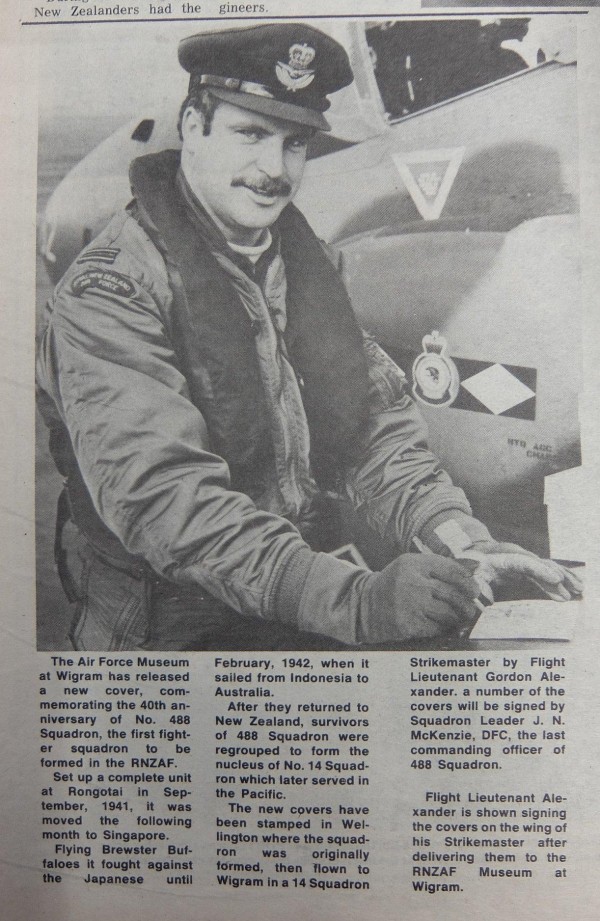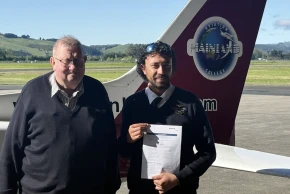Gordon Alexander’s spectacular 50-year career in aviation.
From training fighter pilots for Singapore to jetting executives around New Zealand, Gordon Alexander has done (almost) everything throughout the course of his spectacular 50-year career in the aviation industry. For the past 12 years as Aspeq’s Aviation Manager, Gordon has been applying his extensive experience and deep industry connections towards providing the best possible preparation for aspiring aviators.
“Magic, really magic,” military career
For Gordon Alexander, flying wasn’t so much a career as a calling: “I loved aeroplanes from the word go.”
He spent his childhood at airshows with his equally aeroplane-obsessed father, gazing in awe at the aerial action above, and absorbed in tales of daring ‘do from World War II fighter pilots.
It’s no surprise, then, that at the ripe age of seven Gordon made it his life goal to fly in the air force and geared his education towards meeting the military's strict entry requirements. “It was the only thing I wanted to do with my life. There was no Plan B,” he says.
Thanks to Gordon’s motivation and aptitude, Plan A passed with flying colours. At 17 years old, he became one of the youngest people to be accepted into New Zealand’s air force for pilot training. Once there, he worked hard to be in the third of recruits to make it through to graduation.
His early career flying helicopters took him everywhere from Singapore, where he trained NZ infantry soldiers, to Antarctica on an exchange with the US Navy flying scientists on the continent the year before the Air NZ Mount Erebus disaster. There was search and rescue in the Southern Alps before modern rescue helicopters and numerous disaster relief missions in NZ and the Pacific.
Five years in, though, Gordon’s flying career has reached its limits. “I said to my boss, there are only two things I haven’t done with the Iroquois [helicopter], which is crash it or instruct on it, and I would like to do the latter.”
That opened the door to the next chapter in his career: sharing his passion through teaching aspiring pilots to fly. Following a gruelling flying instructor course in Christchurch, Gordon was posted to Ohakea where he learned to fly - and teach others to fly - jet planes.
He quickly became an accomplished instructor on the fast and powerful aircraft, and after a couple of years at Ohakea, he was sent to Perth as a flying instructor on exchange with the Australian Airforce.
The experience of working in a much larger system but one which shared a similar philosophy on the importance of a high standard of pilot training to support professional military aviation, was one that Gordon relished, and there were several highlights. One of these was flying in the formation display team that flew at the celebration parade of Australia winning the America's Cup in 1983 over downtown Perth. “We displayed to the largest ever TV audience in Australia at the time, ahead of the RAAF ‘official’ display team The Roulettes, who were less than impressed with the ‘hacks’ from the flying school in the West.”
When he came back to New Zealand, it was to ascend to the pinnacle of his air force career. At 32 years old, Gordon was promoted to lead a squadron of 15 jet planes and 120 staff, shouldering the enormous responsibility of overseeing the training and graduation of each and every one of New Zealand's air force pilots. He also led training for those who would become strike pilots, now no longer part of the country's air force.
When Gordon fulfilled his 20 years of military service at 37 years old, he left the Airforce with 5,000 hours in his log-book, a military pension, and zero regrets.
“It was magic, magic, magic. If I could do it all over again, I wouldn’t change a thing.”
From military to civil aviation
Gordon gave early retirement a try, even buying a 20-acre property in North Canterbury to keep him busy, but he quickly got itchy feet.
Luckily, the perfect opportunity soon presented itself: an old military acquaintance was flying a corporate jet out of Christchurch and needed a co-pilot.
Gordon admits carting executives to meetings cross-country didn’t stack up to the exhilaration of flying military jets, but it allowed him to expand his knowledge, experience and networks beyond the military into the civil aviation environment.
He became further embedded in the civil aviation industry by joining Airways, New Zealand’s air navigation service provider. “I talked the training manager into hiring me for a six-week contract to teach on the air traffic control training course and left almost 15 years later as the manager of their international training contracts.”
When Gordon’s then boss at Airways left to become CEO at Aspeq in 2010, Gordon soon followed him for the next chapter in his career in aviation.
Keeping the skies safe through assessments and testing against professional standards
At Aspeq, Gordon found a home for his decades of tactical and strategic experience in the aviation industry. In his role as Aviation Manager, Gordon oversees all of the flight examining activities for the civil aviation sector that have been foundational to Aspeq’s core business for over thirty years.
From theory-based exams through to time spent in-flight with an examiner, Aspeq assesses significant parts of the flight training process and ensures aspiring pilots have the knowledge and competencies required to enter commercial aviation.
In order to do that job effectively, you need to have been around the block yourself a few times, says Gordon.
“Aside from the technical expertise, you need to have a deep understanding of how the flight training world works, including the rules and requirements around licencing and performance.
“I’m our point of contact with the Civil Aviation Authority under whose power we exercise our approval to test people, as I am with all of the organisations that provide flight training and ground training in NZ. It’s extremely high stakes work, for obvious reasons.”
Gordon describes his team’s role as “professional-standards checkers, signing off on the competencies that allow pilots to hold a licence to fly an aeroplane in a commercial environment on behalf of the New Zealand Civil Aviation Authority.
“It’s really, really important that we perform at the top of our game at all times.”
The role also requires keeping a pulse on the wider industry trends both within New Zealand and internationally. In this regard, Gordon’s extensive experience across many continents, decades and sectors within the aviation industry gives him an advantage. Alongside his role at Aspeq, Gordon is Vice President of Aviation New Zealand, an organisation representing all commercial aviation operators across the country.
Looking forward, reflecting back
Despite seeming to have done it all throughout his career, Gordon is not ready to hang up his helmet just yet.
“It’s an all encompassing job with a huge amount of responsibility, so it’s going to be super critical to identify the right person to take over and set them up to succeed.”
With a workshop full of motorcycles to be repaired and Douglass, his Bernese mountain dog, to be walked, Gordon is looking forward to slowly making more time for his hobbies. “I reckon I have enough to keep me going for another 331 years.”
Reflecting back on his spectacular career spanning over half a century, it’s perhaps surprising that it’s not only the time spent in flight that Gordon remembers most fondly.
“I’ve loved teaching. My ‘kids’ are my students and the young people I’ve guided and mentored over the years. I get a lot of pleasure from the fact I’ve been involved in training pilots who go on to achieve super heights themselves. I was given a lot of mentoring in my career and I get a great deal of satisfaction from being able to pass on that guidance and advice to people coming after me.”

More news

Feb 2, 2026
Putting candidates first: How feedback shapes assessments at Aspeq
The Candidate Services team read every single piece of feedback
Read More
Jan 19, 2026
Doing it for others: Aspeq welcomes newest flight examiner
Lifelong aviator Jordan Kean has recently become Aspeq’s newest - and youngest - flight examiner.
Read More